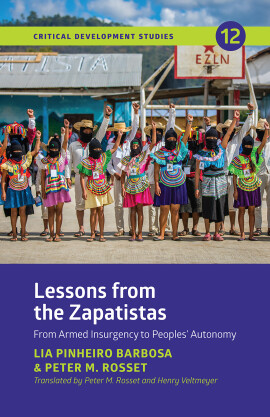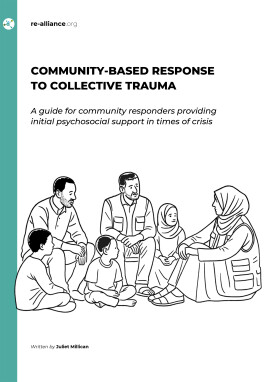
Wellbeing and Quality of Life Assessment
A practical guide
Sarah C White, Asha Abeyasekera
Human development may encompass social, cultural and spiritual facets as well as economic improvement, and development organizations are beginning to recognize this fact. But building into programming a wider understanding of development throws up a number of questions: how do our organizations define wellbeing and quality of life? What do target communities in the global north or south mean by a quality of life? How can we measure change in wellbeing, and attribute it to our programming? Wellbeing and Quality of Life Assessment is a practical resource for people working in social or development policy and practice who are thinking about integrating wellbeing or quality of life in their work in both the global North and South.The main body of the book presents different tools that have been developed and used in social and development policy and practice and outlines the inspiration behind their approach, how it works, what has been learnt through it, and issues and dilemmas that remain.
Published: 2014
Pages: 172
eBook: 9781780448411
Paperback: 9781853398421
Hardback: 9781853398414
| Prelims [ About the editors| Acknowledgements| Foreword by Robert Chambers] | |||
|---|---|---|---|
| PART ONE: Introduction to wellbeing and quality of life: ideas, issues, and choices | |||
| 1 Introduction: why wellbeing? | |||
| 2 Key issues in wellbeing and quality of life assessment | |||
| 3 Practical choices in designing a wellbeing and quality of life assessment | |||
| PART TWO: Wellbeing and quality of life in development practice | |||
| 4 A social justice approach to wellbeing: the PADHI psychosocial framework | |||
| 5 Inner wellbeing: the Wellbeing and Poverty Pathways approach | |||
| 6 Traidcraft: assessing human flourishing | |||
| 7 CAFOD: quality of life Batteries Tool | |||
| 8 Trócaire: measuring change, person wellbeing, and programme impact using the Wheel | |||
| PART THREE: Wellbeing and quality of life in policy and advocacy | |||
| 9 The potential for a wellbeing approach in policy making and sustainable development | |||
| 10 Oxfam’s Humankind Index | |||
| 11 Wellbeing Wales: the Sustainable Wellbeing Framework | |||
| PART FOUR: Going forward | |||
| 12 Conclusion: the politics of working on wellbeing | |||
| Further resources on wellbeing and quality of life | |||
| Index |
Sarah C White Sarah C. White is senior lecturer at the University of Bath. She has more than ten years’ experience researching wellbeing in developing countries, with the ESRC Research Group on Wellbeing in Developing Countries (2002-7); the Religions and Development Research Programme Consortium (2005-10) and the Wellbeing and Poverty Pathways project, 2010-14.
Asha Abeyasekera Asha Abeyasekera is a lecturer at the University of Colombo, Sri Lanka. She worked as Lead Researcher and Programme Manager of the Psychosocial Assessment of Development and Humanitarian Interventions (PADHI) Project, 2006-9.
Examining the concept of well-being and early childhood: Adopting multi-disciplinary perspectives
Lewis, Alyson
Journal of Early Childhood Research, Vol. 17 (2019), Iss. 4 P.294
https://doi.org/10.1177/1476718X19860553 [Citations: 18]Mixed Methods Research in Poverty and Vulnerability
Competing Interpretations: Human Wellbeing and the Use of Quantitative and Qualitative Methods
McGregor, J. Allister
Camfield, Laura
Coulthard, Sarah
2015
https://doi.org/10.1057/9781137452511_10 [Citations: 6]CCTs through a wellbeing lens: The importance of the relationship between front-line officers and participants in the Oportunidades/Prospera programme in Mexico
Ramírez, Viviana
Social Policy and Society, Vol. 15 (2016), Iss. 3 P.451
https://doi.org/10.1017/S1474746416000129 [Citations: 10]Qualitative perspectives on the impact evaluation of girls’ empowerment in Bangladesh
White, Sarah C.
(2015) P.1
https://doi.org/10.1080/19439342.2015.1004609 [Citations: 2]Palaces of Hope
From Boardrooms to Field Programs: Humanitarianism and International Development in Southern Africa
Hitchcock, Robert K.
2017
https://doi.org/10.1017/9781316412190.008 [Citations: 3]Understanding the multiple harms of energy poverty through Nussbaum’s theory of central capabilities
Pellicer-Sifres, Victoria
Simcock, Neil
Boni, Alejandra
Local Environment, Vol. 26 (2021), Iss. 8 P.1026
https://doi.org/10.1080/13549839.2021.1952968 [Citations: 24]Understanding how practitioners in Wales assess well-being in the early years curriculum
Lewis, Alyson
Education 3-13, Vol. 51 (2023), Iss. 5 P.780
https://doi.org/10.1080/03004279.2021.2011943 [Citations: 1]Beyond the grumpy rich man and the happy peasant: mixed methods and the impact of food security on subjective dimensions of wellbeing in India
White, Sarah C.
Fernandez, Antonia
Jha, Shreya
Oxford Development Studies, Vol. 44 (2016), Iss. 3 P.332
https://doi.org/10.1080/13600818.2015.1120278 [Citations: 13]Immigrants gais au Québec face à l’homophobie : possibilités, contraintes et implications pour leur bien-être
Fournier, Claudia
Hamelin Brabant, Louise
Dupéré, Sophie
Chamberland, Line
(2020)
https://doi.org/10.4000/gss.6331 [Citations: 3]Extreme Poverty, Growth, and Inequality in Bangladesh
CHAPTER 3 Leaving no one behind in Bangladesh: the case for a new political settlement
Devine, Joe
Wood, Geof D.
2017
https://doi.org/10.3362/9781780449463.003 [Citations: 3]Relational Well-Being in Policy Implementation in Mexico
Well-Being: A Framework to Assess Relationships in Policy Implementation
Ramírez, Viviana
2021
https://doi.org/10.1007/978-3-030-74705-3_2 [Citations: 0]




